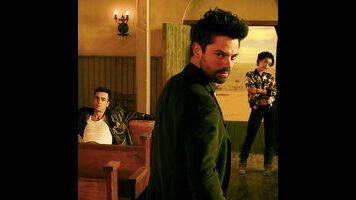I love it when a show outsmarts me. As a viewer and a critic, I love it when my assumptions get turned on their ear, and that happens several times over the course of “El Valero.” The show’s “let’s think of amazing moments and then build a story around them” approach is never going to work perfectly—I think the real reason the first season has been as coherent as it has is that the premise is so strong it takes a lot of effort to fuck it up completely—but again and again, the hour pulled itself back from the brink of disaster. At least once I was convinced things had gone off the rails, only to realize later that I was being led by the nose. And man, I really enjoyed that. It’s the best way to be wrong.
The main example is Donny shooting a handgun near his head in the trunk of his car. I was convinced at the time that he’d killed himself. It’s framed to suggest this; there’s a solemnity to the scene that implies something awful is about to happen, and the careful way Donny goes about his task is the kind of behavior that always surrounds suicides in movies and TV. And it is a very loud bang. Given how the show has worked up until this point, Donny killing himself would’ve been a terrible decision (it’s unmotivated, and we’ve spent enough time with the character by now that he needs to be relevant to the main narrative in some way), but it also wouldn’t have been entirely unsurprising. It’s the kind misstep that happens when you prize big shocks over internal consistency.
Then Donny shows up later on with dried blood trickling out his ears and the whole thing makes a lot more sense. It is, in fact, a terrific capper to his arc as a character, and manages to make him more interesting, rather than less. He’s one of the only people who knows what Jesse can do, so he takes a logical (if extreme) step towards protecting himself by making himself deaf. Even better, it works! He gets the drop on Jesse, and manages to bring an end to the preacher’s one man stand-off against Odin and his crew. After weeks of seeing Donny getting laughed at and mocked, there’s a weird satisfaction in this, one that plays nicely off the fight scene from the pilot. Then, we were happy to see Jesse kicking some ass; now, we’re happy to see one of his victims stand up for themselves. (Especially happy that it’s not the bus driver who wanted to molest one of his passengers.)
That dynamic shift is another thing the show has managed to pull off; by taking so much time this season to let Jesse fuck up, we’ve gotten a chance to explore and understand the impact of his powers beyond the cool factor. It’s not an approach that always clicks, and I hope the second season will streamline things a bit (hopefully by then Jesse will have gotten his shit together), but there’s something to be said for taking the time to really earn a character shift, rather than let it happen overnight. While Jesse’s speech to Odin at the end about wanting to call God to account for his actions doesn’t feel entirely organic, the idea of it is sound—all season, Jesse’s been basing his actions off of what he thought the Lord wanted of him, and he’s finally starting to realize that the Lord might not have such a great plan after all.
The (sort of) return of Eugene offered another chance to peek into Jesse’s head, as well as another fake-out. This one got me too. Jesse asks God to bring Eugene back, promising never to use the Voice again if He does, and lo and behold, Eugene comes crawling up out of the earth. (This also works as a great way to justify why Jesse doesn’t just use the Voice on Odin and his men. He’s getting more reluctant with the power, and for a while, it actually seems like God accepted his offer.) It’s not Eugene, sadly; it’s just a figment of Jesse’s overworked, self-loathing imagination. The “hallucinated person” is a very much a writer’s conceit, but it works because the show’s inherently heightened reality. Ian Colletti does a fantastic job making Jesse’s imaginary Eugene just a bit sharper than the real version, and the result is something that works to throw the hour even further off kilter.
Not every decision in “Ev Valero” is as effective. The tone doesn’t always work; while the craziness of Odin’s attack on the church (including an impromptu summer barbecue that had shades of Ace In The Hole) was pretty much on point, Jesse shooting off one of the men’s dick went over the line between playful absurdity and forced nuttiness. This is clearly supposed to be hilarious (the score goes out of its way to point that out), and sure, a guy saying “He shot my dick off” over and over is pretty funny. But it’s the kind of humor that spends too much time drawing attention to itself. It raises questions, and makes it harder to take seriously the parts of the episode we’re clearly supposed to care about.
Like the cold open, that finally shows us what Jesse’s dad was doing when Odin called him over in the middle of the night. Odin lost his whole family in a bizarre skiing accident, and had the corpses shipped home; then he killed a cow and compared the cow’s intestines to his daughter’s. Barring certain practical considerations (I feel like a teenage girl’s intestines would be smaller than a cow’s?), this is the kind of insanity the show does well, something beyond the pale of “realism,” maybe, but coming from a place of emotional truth. Faced with the loss of everyone he loved, Odin tried to find answers the only way he knew how, and could not. Jesse’s dad had no solace to give, so now Odin believes in the God of Meat. The god of tangible things. That’s the God Jesse ordered him to serve, and it’s a fine reveal that puts Odin’s seemingly inexplicable behavior into sharp focus.
“El Valero” also brings back the angels, this time on Jesse’s invitation. You could argue this is a necessary scene; given everything that’s happened, it would make sense that Jesse would at least try to get rid of Genesis. But there’s something frustratingly circular about the sequence as well. It provides some arguably necessary character work, but it also doesn’t move the story forward in any meaningful way. We know there’s a way to get Eugene out of Hell, but we don’t know what that way is. We know that it’s possible to get Genesis out of Jesse, but the spirit apparently doesn’t want to stay on its own for very long. (Given that it escaped Heaven at the start of the season, and nothing has changed for it since then, why would they think it would willingly go back?) The result is a sequence that’s perfectly fine, maybe even unavoidable, but still not all that thrilling to watch. Thankfully the angels leave promising some new threat, so things are sure to get even more interesting next week.
The only other major thread to follow here is Tulip, and her scenes are so detached from the rest of the episode that put together, they almost make up their own short film. She adopts a dog; she spends the day playing with the dog; she hugs the dog (cursing Jesse Custer’s name); and then she lets the dog into the backroom where something devours it. It doesn’t take much to guess that this “something” is a sun-spoiled Cassidy, who never makes a physical appearance in the hour. So I guess we know Jesse didn’t put him out with the fire extinguisher. You could quibble with Tulip’s methods here (she couldn’t rob a blood bank?), but the result is a great character beat for her, and a growing connection between her and the vampire that will almost certainly end badly for everyone. I’m all for it.
Stray observations
- “Which is my daughter, and which is the cow?” -Odin
- The episode’s surprisingly stingy with the fight scenes; the only major hand-to-hand combat takes place inside the church, with us watching outside. It’s a cool visual effect, but I also like watching people get punched, so that was slightly disappointing.
- “Food court! Food court!” See, that’s the kind of absurdity I can get behind.
- “You dug out of Hell with your hands?” “It’s not that far.”
- Jesse ends up arrested. I wonder if Odin agreed to let him preach one last time.
- The episode ends with a man releasing the pressure on an overloaded system—looks like something in a power plant. We’ve seen this before, and I’m not sure what it’s building towards, but I’m sure it’ll be a big deal when it happens.









































